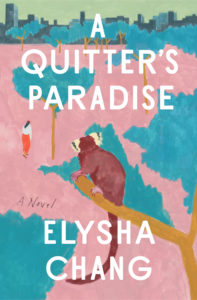 Review by Sarah Lyn Rogers
Review by Sarah Lyn Rogers
In Elysha Chang’s debut novel, A Quitter’s Paradise, two sisters buckle under lifelong pressure from their mother, Rita, who immigrated with their father, Jing, from Taipei and made enormous sacrifices to ensure that the girls would have an ideal life—which, to Rita, means a dutiful and financially successful one.
This searching, often darkly humorous novel follows Eleanor, the “successful” daughter and scientist, who we learn never truly liked science—or is even especially good at it—but did enjoy the rare praise she received from being perceived as the studious one. Now, reckoning with her mother’s death and the intense burnout that’s causing her to make increasingly bad decisions in her career and personal life, she seeks to better understand her mother and hopefully, in doing so, herself. Narisa, the older and more rebellious sister, handled the pressures of expectation in a different way: after a blowout argument with her family when she was a teenager, she first moved into her father’s warehouse, then ran away, reasoning “They wanted her to disappear, to replace herself with someone who obeyed” (186).
In some ways, this book is shaped like a typical novel, with tensions escalating to an unbearable point before they subside. But this book also resists a typical novel’s big epiphanies. What it lacks in satisfying aha moments, it makes up for in how true to life that is: The pressures, assumptions, and (often unnamed) beliefs of a family system are too big of a knot for any one character to fully untangle. Our own unchecked beliefs and personal narratives are largely invisible to us.
Eleanor’s chapters are written in first person, giving readers an intimacy with her more limited point of view. Other chapters, chronicling family history, are written in a rotating close third, allowing readers access to family members’ thoughts and motivations, even Eleanor’s, that she is not fully aware of. It’s a really interesting and effective style choice. On page 60, we learn that:
It didn’t occur to Rita to wonder why Eleanor never corrected mistakes, never offered opinions, convictions, suggestions, clarifications….How had she trained herself to be so amendable? … Simple. Eleanor did not really rule herself or any realm of her life. She inhabited a world that belonged always to someone else.
These backstory sections are some of the strongest in the book. They let us peek at the wiring inside the machine, at everyone’s self-justified reasons behind their actions. Eleanor flounders in the present, and her sections are structured to mirror that internal floundering. Challenging for a protagonist, she doesn’t really know her own motivations—because she has never been allowed to know what she wants, separate from what other people want her to want for herself. We watch her struggle to desire the life she has built, and struggle to imagine what she could build instead.
This book asks big questions about the duties of motherhood and daughterhood, including: Where does one person’s story begin and the other’s end? Eleanor describes the dynamic like this: “She was always hexing what I did by mapping her regrets onto mine” (16). Years before her death, Rita asks “Why hide yourself from me?” (35) when Eleanor severs contact after Rita disapproves of her marriage. But in many ways, Eleanor has been hiding herself from her mother her whole life; whoever Eleanor is on the inside, she hid her, presenting instead the ideal, STEM-loving brainiac her mother cultivated. Rita’s hurt in the email is palpable. But in it, we watch her fashion herself the author/boss of Eleanor’s story: Eleanor is “sad, crazy, and alone” (36) and marriage will be the end of her life.
What do we owe each other? Is a life lived for someone else (a mother sacrificing for her daughters, a daughter accepting the role she is assigned) a worthwhile price to pay for “success”? Eleanor’s parents achieved their dream of financial success in the United States. Co-running a product line and—briefly—employing Narisa at their warehouse implies interesting things about a family business and a family run like a business. Where is the first wound? Maybe this: Before she even has daughters, Rita realizes that Jing will never love her, that they are merely business partners.
This is not a novel where loose ends neatly tie up at book’s end. Elysha Chang has written something more honest than that about the messy realities of inheritance, and what we can make out of what we are given.
A Quitter’s Paradise by Elysha Chang
SJP Lit/Zando, 2023,
Hardcover, 305 pages
ISBN 978-1638930525
Sarah Lyn Rogers is an NYC-based writer and editor. Her editing credits include books for Soft Skull Press and serving as series co-editor for the annual anthology Best Debut Short Stories: The PEN America Dau Prize. She is the author of the chapbooks Inevitable What (Sad Spell Press, 2016) and Autocorrect Suggests “Tithe” (Ghost City Press, 2021). Her debut full-length collection, Cosmic Tantrum, is forthcoming from Curbstone Books/Northwestern University Press. For more of Sarah’s writing, or to work with her, visit sarahlynrogers.com.
